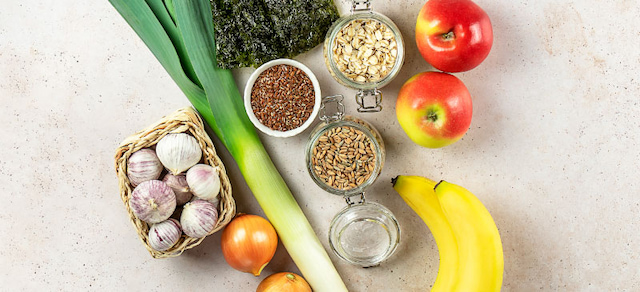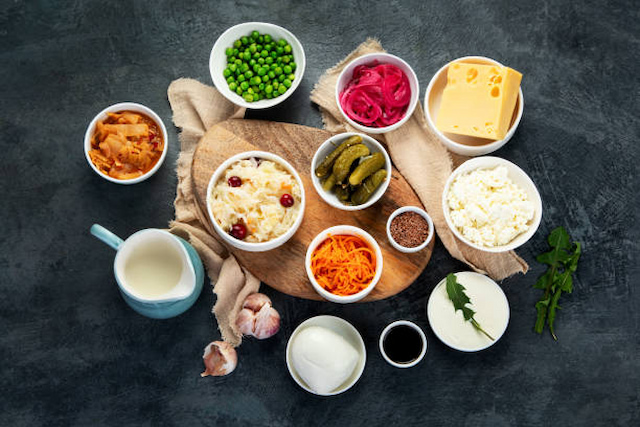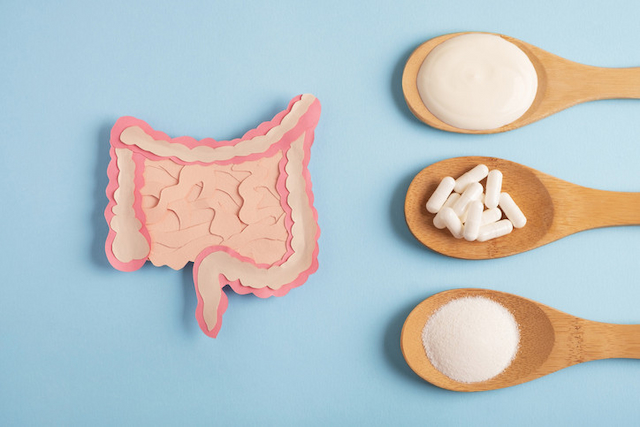Most adults are familiar with prebiotics, especially since they’re often mentioned alongside probiotics in health conversations. Doctors frequently recommend or prescribe prebiotics in tandem with probiotics, as each serves a unique yet complementary role in supporting our health and metabolism. While probiotics introduce beneficial bacteria into your gut, prebiotics serve as nourishment for those bacteria, fostering their growth and effectiveness. Together, they create a powerful duo that works to support gut health, enhance digestion, and help you feel your best.

What Are Prebiotics and What’s Their Function?
We have trillions of microorganisms living in our gastrointestinal tract, or GI. They make up our microbiome and are also known as gut microbiota. The main home for these microorganisms is our large intestine. These microorganisms perform vital tasks for our general health, such as regulating the immune system and metabolising nutrients.
They even have the power to influence the risk of getting some serious diseases and health issues, such as inflammatory bowel disease, type 2 diabetes, and colon cancer. Out of all of the microbiomes, prebiotics are essential. They’re nutrients that gut bacteria break down or ferment. This process releases short-chain fatty acids that help in lining the colon.
They also promote the growth of beneficial microbes and improve the function of our gut’s bacteria. Prebiotics need to be able to be fermented by intestinal microbes, resist stomach acid and digestive enzymes, not be absorbed in the gastrointestinal tract, and should stimulate growth and activity of our intestinal bacteria.
Prebiotics vs Probiotics

Although they promote beneficial bacteria and organisms in your stomach to help with digestion, prebiotics and probiotics work differently. The probiotics are live organisms, often some strains of bacteria and yeast. They can be found in some foods and increase the number of microbes that are already living inside your gut.
Prebiotics aren’t living organisms. They are naturally occurring dietary ingredients. In short, they’re the food for the probiotics so they can grow and develop properly. Probiotics need an efficient and effective prebiotic to give you a healthy gut.
How to Take Prebiotic Supplements?
These supplements are often recommended by doctors for improving your gut health. But you can’t just take them randomly whenever you want and how much you want. There are regulations you should follow. Otherwise, you might disturb the gut microbes and cause more harm. Doctors suggest that you should take around 2.5–10 grams per day.
This dosage will have a meaningful effect on your health. Most of the products on the market will have around 1.5-5 grams of prebiotics in one serving. But this mainly depends on the manufacturer. It’s recommended that you take the supplements with some food or beverage. If it’s a powder, you can mix it in water and add it to a smoothie or yogurt.
Remember that many prebiotics have special instructions you should follow when taking them as a supplement. Psyllium husk for example, should be taken with a lot of liquids because it can cause constipation. Always read the instructions so you can avoid the potential side effects. Just to be safe, start with a smaller dosage and increase it over time to minimise the digestive side effects.
Best Prebiotic Foods
There are plenty of foods that are rich in prebiotics. Besides taking the supplements, you can increase the prebiotics consumption through these foods. Apples are eaten all over the world and are a great source of prebiotics because of the pectic they contain. Pectin prevents overgrowth of bad bacteria and increases the growth of healthy bacteria.
Raw asparagus is also a nice prebiotics source. Bananas contain inulin, which is great for both babies and adults. There’s research that shows that women who ate one banana a day had a healthier gut bacterium and less bloating compared to the ones that didn’t eat bananas.
Barley has great digestion benefits. It prevents inflammation in people who have inflammatory bowel disease. Burdock root also has inulin. You can consume it as a food but you can also find it as a probiotic supplement. Chicory root stimulates the growth of healthy bacteria and improves bowel movement. This leads to a possible prevention of diabetes.
Dandelion greens are very nutritious and rich with vitamins C, A, and K, minerals like iron, magnesium, and calcium, and a good source of fibre. It’s also a natural diuretic and removes extra fluids that the body retains. You can consume it as food, herbal tea, or as a supplement.
Flaxseed and similar foods can bring a lot of benefits for your gut microbiome. It’s filled with fibre and helps the good bacteria to proliferate. Besides being good for your gut, flaxseed can help in reducing blood CRP levels and overall inflammation. Garlic may not sound appealing to many people, but it has a plethora of health benefits, including improving gut health.
Both sunchokes and konjac root stimulate the growth of healthy bacteria and prevent overgrowth of the harmful bacteria in the gut. Konjac root also helps with diabetes management and keeping bowel movement regular. As one of the most commonly consumed breakfast items in the world, oats are a great source of fibre, iron, zinc, vitamin B and manganese. All of these nutrients are very beneficial for your gut.
Benefits of Using Prebiotics

Good Immune System
Taking a good prebiotic supplement can keep your immune system happy and healthy because gut microorganisms have the power to impact your immune system. Prebiotics increase the activity of GALT, or gut-associated lymphoid tissues, which promotes health and lowers the chance of illness.
Cancer Prevention
By altering the activity of the intestinal microbiota, prebiotics will help prevent colorectal cancer. This effect is mainly caused by the production of SCFA and modifying the gene expression in cancerous cells.
Prevent Inflammatory Bowel Disease
The main reason for inflammatory bowel disease is dysbiotic intestinal microbiota. By taking probiotic supplements, you improve the mucosal barrier and prevent IBD. They nourish the bowel wall and improve your gut health.
Relieve Constipation
The main reason or cause for constipation is intestinal dysbiosis. The probiotic you’ll take will stimulate the growth of the beneficial bacteria and relieve your constipation. Once the constipation is gone, there will be better blood flow in that area and increased intestinal motility.






















